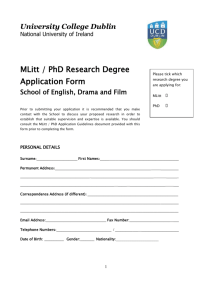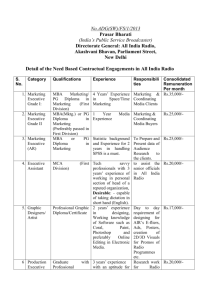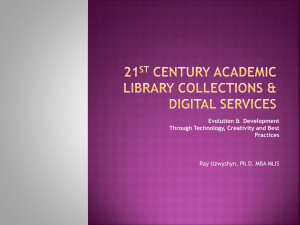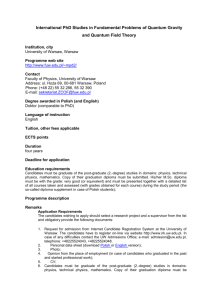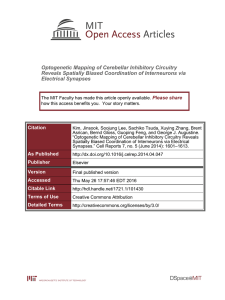Higher Diploma in Library and Information Studies (HDipLIS)
advertisement
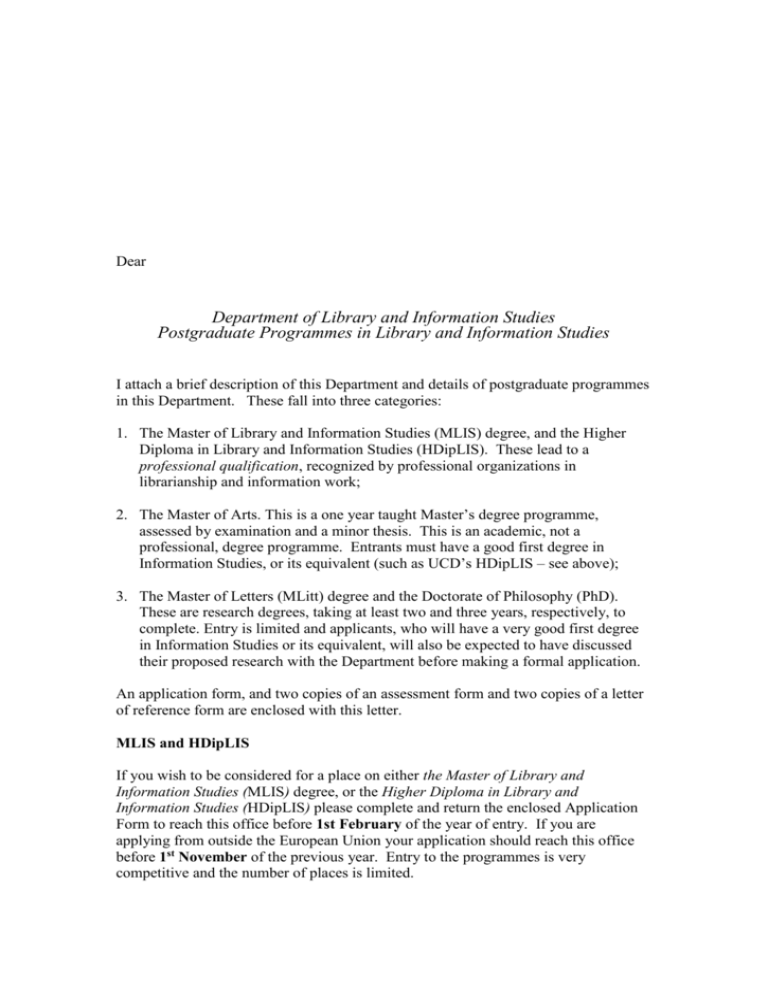
Dear Department of Library and Information Studies Postgraduate Programmes in Library and Information Studies I attach a brief description of this Department and details of postgraduate programmes in this Department. These fall into three categories: 1. The Master of Library and Information Studies (MLIS) degree, and the Higher Diploma in Library and Information Studies (HDipLIS). These lead to a professional qualification, recognized by professional organizations in librarianship and information work; 2. The Master of Arts. This is a one year taught Master’s degree programme, assessed by examination and a minor thesis. This is an academic, not a professional, degree programme. Entrants must have a good first degree in Information Studies, or its equivalent (such as UCD’s HDipLIS – see above); 3. The Master of Letters (MLitt) degree and the Doctorate of Philosophy (PhD). These are research degrees, taking at least two and three years, respectively, to complete. Entry is limited and applicants, who will have a very good first degree in Information Studies or its equivalent, will also be expected to have discussed their proposed research with the Department before making a formal application. An application form, and two copies of an assessment form and two copies of a letter of reference form are enclosed with this letter. MLIS and HDipLIS If you wish to be considered for a place on either the Master of Library and Information Studies (MLIS) degree, or the Higher Diploma in Library and Information Studies (HDipLIS) please complete and return the enclosed Application Form to reach this office before 1st February of the year of entry. If you are applying from outside the European Union your application should reach this office before 1st November of the previous year. Entry to the programmes is very competitive and the number of places is limited. Please include with your application, on a separate piece of paper, a summary of about 300 words on one A4 page of your career aspirations in relation to this study opportunity at University College Dublin. You should also send one "Letter of Reference" form to each of your two referees, for him or her to forward to the Department when completed. Your C.V. may be included with your application, but please note that completion of all sections of the form is compulsory. You may, if you wish, also complete and return one copy of the assessment form, giving your own estimate of your level of attainment under each heading. You are also encouraged to link the assessment form to the summary of your career aspirations. You should in any case study the assessment form: a form like this will be used by the Department to assess your application. If you wish to receive a written acknowledgement of your application, please enclose a stamped addressed envelope. There is a combined selection procedure for the HDipLIS and MLIS programmes. You should indicate your preference on the application form: this will not affect your chance of success in any way. Please note that while it is necessary to have experience of work in a library or information environment before commencing the HDipLIS or MLIS, you may apply for a place before obtaining this experience. If you don’t have experience, you should indicate what plans you have to fulfil this requirement. All programmes require full-time study. Please note that these programmes do not attract any special funding. Students must pay full fees and maintain themselves. The Department cannot arrange work experience or any financial aid. MA, MLitt, PhD If you are interested in purely academic postgraduate study, you should apply for the MA, MLitt, or PhD. Please request the separate application form. The closing date for receipt of MA applications is 1st May of the year of entry. Candidates for the PhD are usually registered first as MLitt students and their registration is changed later if appropriate. Yours sincerely, __________________________ Dr Ian Cornelius, Admissions Coordinator. (Ref.c:brochure/revisedpostglet.doc) UNIVERISTY COLLEGE DUBLIN The Department of Library and Information Studies (DepLIS) The Department Welcome to the Department of Library and Information Studies (DepLIS) in the National University of Ireland, Dublin, generally known as UCD. The Department has its origins in the Library School that was part of UCD Library from 1928 to 1975. A separate academic Department was established in 1975 with a wider remit for education and research in Library and Information Studies in the Republic of Ireland. The range of academic programmes offered by the Department has evolved dramatically in the quarter century since 1975, when the only academic programme offered by the Department was a one year Diploma in Library and Information Studies. These include the extension of programmes of study leading to professional qualifications to primary degree (BSocSc) and Master's (MLIS) levels and the introduction of purely academic programmes in Information Studies at BA, BSocSc, MA, MLitt and PhD levels. UCD is now the only institution on the island of Ireland providing professionally accredited qualifications in Librarianship or Information Science. Departmental staff includes seven full-time equivalent permanent academic staff, a Senior Fellow, a Systems Demonstrator and a Departmental Secretary. The Faculty of Human Sciences The Department of Library and Information Studies is in the Faculty of Human Sciences since 2003. This is the newest Faculty in UCD and consists of eight academic departments, Economics, Education, Library & Information Studies, Philosophy, Politics, Psychology, Sociology and Social Policy & Social Work. It also includes three major research centres, the Institute for the Study of Social Change, the Institute for British Irish Studies and the Social Sciences Research Centre. Information Studies Information Studies is defined as the theoretical and experimental investigation of the interaction between people and recorded knowledge. The discipline is concerned with the generation, representation, communication, storage, organisation and use of various types of information (text, numbers, still and moving images, audio) in a range of formats (print, visual, audio, multimedia) by individuals, groups, organisations and society as a whole. The focus is on current communication patterns and their impact on society; the enhancement of access to the cultural record, both historic and contemporary, relating to Ireland and elsewhere; and on future technological and social developments in the above areas. Programmes of Study The Department offers undergraduate courses in Information Studies at first, second and third year levels in both the Bachelor of Arts (BA) and Bachelor of Social Science (BSocSc) programmes. It also offers the following postgraduate programmes: Higher Diploma in Library and Information Studies (HDipLIS), Master of Library and Information Studies (MLIS), Master of Arts (MA) (Information Studies), Master of Literature (MLitt) (Information Studies), Doctor of Philosophy (PhD). The HDipLIS and MLIS are both one year taught programmes (September - May and September - September respectively) and are designed to prepare university graduates for professional careers in library and information work. The MLIS requires the submission of a minor thesis and provides an opportunity to undertake advanced study and research in library and information studies. Students may select specific pathways through the HDipLIS and MLIS in order to obtain professional accreditation by the Library Association of Ireland. The MA (Information Studies) is a one year (September - September) taught course awarded on coursework and a minor thesis. It does not lead to professional accreditation. The MLitt (Information Studies) is a two year degree by major thesis and is intended for those wishing to extend their knowledge of information studies by research. It does not lead to professional accreditation. The Department also admits a number of students to the PhD programme. This area is currently under expansion and potential applicants are encouraged to contact the Department for further details on potential research areas and possible sources of funding. Research There is a strong commitment to conducting and fostering research in Library and Information Studies in the Department. Academic staff are engaged in a broad spectrum of pure and applied research activities including externally funded projects and a significant body of research is also undertaken for major and minor theses by postgraduate students on the MA, MLitt and PhD programmes listed in the previous section. The PhD programme is growing rapidly from having one or two part-time students to eight, of whom seven are full-time, in 2004-2005. Programme Descriptions and Requirements Descriptions and requirements for the MLIS and the HDipLIS follow. application and self-assessment forms are accessible separately. The Degree of Master of Library and Information Studies (MLIS) (Programme Code: HSMXF0009) Course Objectives The MLIS Degree prepares students for professional careers in information or library work, and provides an opportunity for advanced study and research. Admission Candidates must be graduates of a recognised university and must normally hold one of the following: i) A primary Degree with at least Second Class Honours, Grade II in two subjects; ii) A primary Degree with at least Second Class Honours, Grade I in one subject; iii) A primary Degree and the University’s Higher Diploma in Library and Information Studies with at least Second Class Honours or an equivalent qualification. Candidates who wish to study part-time for this Degree must hold a primary Degree and the University’s Higher Diploma in Library and Information Studies, or an equivalent qualification, with at least Second Class Honours in the Diploma or in the Degree as specified in (i) or (ii) above. Applicants must be recommended by the appropriate Professor or Head of Department and approved by the Faculty of Human Sciences. Candidates must normally have experience of work in a library or information environment before commencing study on the course. It is not necessary to have this experience at the time of application. Organisation of Studies The normal duration of the course is one year for full-time students and two years for part-time students. Candidates who do not hold the Higher Diploma in Library and Information Studies must accumulate twenty-two units, from courses chosen in consultation with the Department, and submit a minor thesis, written under the direction and supervision of the Department. At least ten units must be acquired from advanced courses. Candidates who hold the Higher Diploma in Library and Information Studies must accumulate at least eight units from appropriate courses, as prescribed by the Department, and submit a minor thesis, written under the direction and supervision of the Department. Certain course units are compulsory. Not all courses will be available in each semester or year. Course Units for MLIS Course Number Units IS-P411 2 IS-P412 2 IS-P413 2 IS-P415 2 IS-P417 2 IS-P418 2 Advanced IS-P422 IS-P423 IS-P431 IS-P433 IS-P441 IS-P442 2 2 2 2 2 2 IS-P444 IS-P446 IS-P447 IS-P449 IS-P456 IS-P461 IS-P463 IS-P464 IS-P465 IS-P466 IS-P467 2 2 2 2 2 2 2 2 2 2 2 IS-P468 IS-P471* IS-P473* 2 2 2 Level Course Title Information Policy Culture, Information and Technology Issues in Information Studies Information and Society Communications and the Consumer Librarians and Information Seeking in the 21st Century Workplace Advanced Rare Books Curatorship History of the Book Management of Information Agencies Advanced Human Resources Management in Information Units Bibliographic Information Resources Advanced Information Literacy Instruction: Theory and Practice Advanced Advanced Advanced Advanced Advanced Advanced Advanced Advanced Introduction to Electronic Resources European Information Markets Literature for Children Archives and Manuscripts Cataloguing and Classification Telecommunications and Networks Database Management Systems Introduction to Computers and Databases Web Publishing Advanced Web Publishing Knowledge Management (Electronic Library and Resource Management) Electronic Library Systems Research Methods I Research Methods Seminar II Assessment Candidates for the MLIS Degree are required to complete course work, sit a written examination and submit a minor thesis in accordance with University regulations. An oral examination may be held if the examiners so decide. NB. In addition to the two * compulsory courses and units, MLIS participants must select a minimum of 10 ADVANCED course units. Application Procedure For details of application procedures contact: The Secretary, Department of Library and Information Studies Library Building, University College Dublin Belfield, Dublin 4 Telephone: Fax: +353-1-716 1161 +353-1-716 7055 The final date for receipt of applications is 1st February of the year for which entry is sought. Last updated by Noreen Hayes 2 Nov. 2004. Higher Diploma in Library and Information Studies (HDipLIS) (Programme Code: HSHDF0002) Course Objectives The graduate Diploma prepares students for professional careers in information or library work. Admission Requirements Candidates who hold a recognised university Degree will be considered for admission to the Diploma course in Library and Information Studies. Candidates must normally have experience of work in a library or information environment before commencing study on the course. It is not necessary to have this experience at the time of application. Application Procedure Applications should normally be received by the Department of Library and Information Studies, Library Building, University College Dublin, Belfield, Dublin 4 (telephone: +353-1-7167055) by 1st February of the year of entry. Course Structure The normal duration of the course is one academic year (September – May). Course Syllabus Students take a combination of course units, as advised by the Department. Students must accumulate at least twenty units including certain compulsory courses. No more than ten units may be taken from advanced course units. Course Units for HDipLIS Course Number IS-P411 2 IS-P412 2 IS-P413 2 IS-P415 2* IS-P418 2 IS-P422 IS-P423 IS-P431 IS-P433 2 2 2 2 IS-P441 IS-P442 Practice IS-P444 IS-P445 IS-P446 IS-P447 IS-P449 IS-P456 IS-P461 IS-P463 IS-P464 IS-P465 IS-P466 IS-P467 2* 2 IS-P468 IS-P471 2 2 2 2 2 2 2 2* 2 2 2 2 2 2 Units Level Course Title Information Policy Culture, Information and Technology Issues in Information Studies Information and Society Advanced Librarians and Information Seeking in the 21st Century Workplace Advanced Rare Books Curatorship History of the Book Management of Information Agencies Advanced Human Resources Management in Information Units Bibliographic Information Resources Advanced Information Literacy Instruction: Theory and Introduction to Electronic Resources Advanced Advanced Electronic Resources Advanced European Information Markets Literature for Children Advanced Archives and Manuscripts Cataloguing and Classification Advanced Telecommunications and Networks Advanced Database Management Systems Introduction to Computers and Databases Web Publishing Advanced Web Publishing Research Knowledge Management (Electronic Library & Resource Management) Advanced Electronic Library Systems Advanced Research Methods NB. In addition to the three * compulsory courses and units, HDipLIS participants must select at least two units from Information Technology/Knowledge Management modules (i.e. from IS-P461, IS_P463, ISP464, IS-P467, IS-P468) Not all course units will be available in every semester or year. Last updated by Noreen Hayes 2 Nov. 2004.
